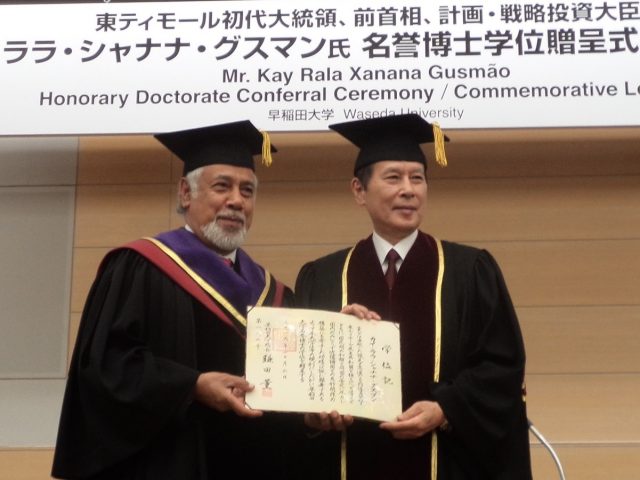
In his introductory address, President Kaoru Kamata of Waseda University mentioned distinguished contributions former President and Prime Minister Kay Rala Xanana Gusmão had made to peacebuilding of not only his country but around the world. Minister Gusmão, in a commemorative lecture delivered at the University, spoke of the enduring relationship between Japan and Timor-Leste recalling that Timor-Leste’s first Meeting with Development Partners, held in Tokyo in 1999, was “an indication of the important role that Japan would be playing in building our nation.” He spoke of Japan’s impressive post –war reconstruction as “an inspiration to the world” and highlighted Japan’s industrial and technological development, trade policies, investment in quality education and cultural features, as having enabled the country to become an important world power, after being “born out of the ashes and the trauma of war.” In a press release issued by the Government of Timor-Leste, Government Spokesperson and Minister of State Agio Pereira noted that “Japan has been a consistent friend of Timor-Leste and this recent visit further strengthens our strong relationship built over many years. The conferral of the Honorary Doctorate reflects the respect the Japanese people have for H.E. Kay Rala Xanana Gusmão and the mutual respect that characterizes the relationship between our two countries.”
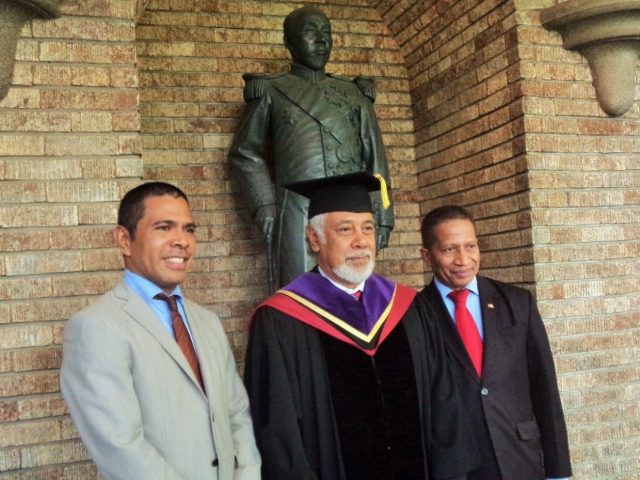
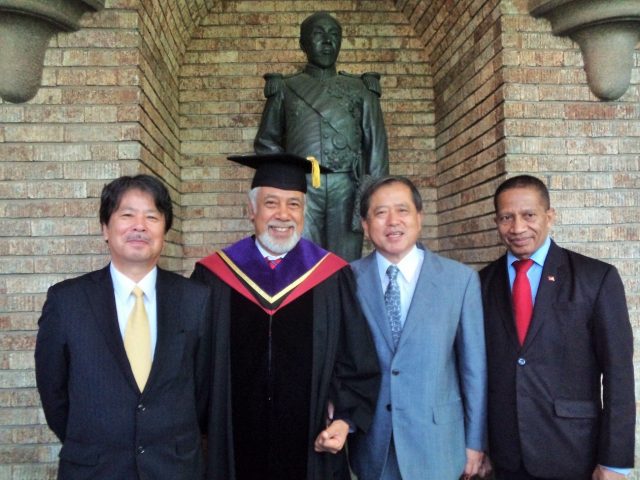
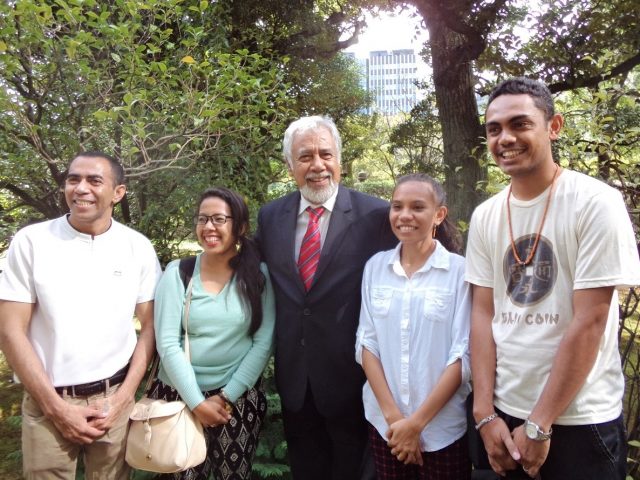
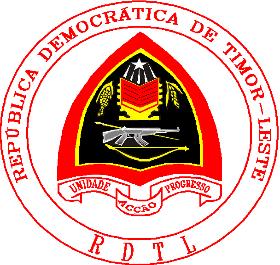
Dr Kaoru KAMATA, Rector of Waseda University
Mr Shinsuke SUGIYAMA, Vice Minister for Foreign Affairs of Japan
Honourable Members of the Council of Deans
Honourable Directors of Faculties
Ladies and gentlemen
Friends of Timor-Leste
Dear students,
It is a great honour for me to be here, today, receiving this high academic degree from Waseda University.
I am humbled to be standing here, before this illustrious audience, and, more importantly, I am flattered to have been chosen to receive this Honoris Doctorate in Law, by this leading institution, one of the most prestigious Universities in Asia and in the World.
This University is internationally recognized for its academic excellence and for preparing so many Japanese who became leaders of this country, throughout the years and in several important fields and areas of knowledge. In other words, Waseda Daigaku has been contributing, since 1882, to build human resources for this vibrant and modern nation.
As such, it is an enormous privilege to be here, which is why I cannot but thank for the complacence of choosing me for this award.
Those, who have heard a little of my background, will know that my “education” was not academic – instead, I attended what is called “the school of life”. I didn’t have the opportunity to enrol in advanced or scientific studies, or even in military studies, beyond the compulsory military service, for three years as a soldier. But, being one of the two survivors, in 1979, after the extermination of the Resistance Movement’s leadership, I took in my hands the difficult duty to lead the complex journey of a resilient people who dared to dream of independence.
My people, and the circumstances of the struggle, taught me that everyone can change the status quo, if there is a good and analytical understanding of the process, perseverance and firm determination to work for the collective goals. In other words, nothing is impossible if there is a strong will and commitment to face all the challenges. This Memorial Hall, where we are in at this very moment, symbolizes the impressive Vision of a great son of Japan, Shigenobu Okuma, who gave a Mission to Waseda University to ‘contribute to the advancement of knowledge… and extend its influence and activity to the world at large’.
Kindly allow me to recall, briefly, the history of the Timorese people – very poor people living in a small country in a corner of Southeast Asia, who became great, almost two decades ago, when Timor-Leste made its mark on the map, as the youngest country at the start of this millennium.
Like so many other countries throughout the world, we too have a story of colonial domination that spanned several centuries. Colonial history is, almost invariably, a narrative of suffering, bottled up inside or expressed through struggles for independence. In our case, these struggles were waged by the various kingdoms that existed in Timor, until 1912, that marked the last big anti-colonial rebellion.
Between 1941 and 1945, we felt the effects of the Second World War. Although short lived, the Japanese occupation covered our entire territory and caused great suffering to the Timorese people.
The Portuguese Revolution of 1974 brought a glimmer of hope that the Portuguese colonies might be free, with the announcement that they would be granted their independence.
This was the start of political associations in Timor-Leste, which were created as the Timorese became increasingly willing to decide their own future. Thus, despite our inexperience and lack of preparation to govern, a feeling of collectiveness and belonging to our nation started to take root. Too rooted, in fact, for any foreign occupation to be able to pull it out.
On 28 November 1975, we unilaterally declared our independence from Portugal. However, nine days later, we were invaded and subsequently annexed by Indonesia, with the consent of the United States of America. Curiously, a new war started in Southeast Asia on the very year when the Vietnam War ended.
During that difficult period of struggle, we came to understand that, in international affairs, there are those who are realistic and those who are idealistic. To the realistic, international relations are driven by power. Guided by this principle, in 1979, Australia became the only Western nation to offer de jure recognition to the criminal annexation of our country, which gave way to start the negotiations with Indonesia to settle a joint exploitation of the resources under our sea.
Subsequently, in 1989, Australia signed with Indonesia the agreement, with then foreign ministers Gareth Evans and Ali Alatas famously clinking champagne glasses in a plane above the Timor Sea. This agreement was known as the Timor Gap Treaty, a treaty that didn’t establish a maritime boundary but for the only purpose of providing an equal sharing of the exploitation of the valuable resources in the part of the seabed, claimed jointly by both, Australia and Timor, yet at the time under Portuguese administration.
But, to us, international relations should be guided by ethics and justice.
Our journey shows that, sometimes, idealism can prevail over realism. Indeed, not always do, those who are strong and mighty, prevail over those who are small and weak. Trapped in the insularity of our half island, subjugated by military occupation and lacking any foreign assistance, we felt the need to understand the reality from a regional perspective. We learned to use critical thinking when seeing the world, while internally we strengthened the patriotic spirit and the need of National Unity.
Year after year, we started to witness a magnificent connection of good wills, by both governments and solidarity organisations throughout the world, which proved invaluable to Timor-Leste’s self-determination process. In this matter, I must underline and praise the extraordinary Japanese solidarity through the Japan Timor-Leste Parliamentary League. It was so encouraging that I could meet Mr. Masahiko KOMURA and Mr. Mitsuru YAMADA, who visited me in the Indonesian prison.
The time arrived and, in the middle of a monetary crisis in Southeast Asia, President Soeharto was forced to step down, that led to a democratic transition in Indonesia. Before that happens, we realised already that both our peoples – Timorese and Indonesian – had been the victims of the same regime, which had been a faithful ally of the Western democracies during the Cold War period. And, after 24 years of suffering, despite the atmosphere of violence, our people voted overwhelmingly in favour of independence, in a Popular Consultation held on 30 August 1999, under the auspices of the United Nations. Unfortunately, this brought further death and destruction all over the country.
In addition to the strength of our people and the vital role played by the Timorese resistance, there was another great force on the side of Timor-Leste, concretely during the home stretch leading to our independence. I am speaking of the community of nations, the international system and international law.
One of our battlefields was the United Nations, which was itself dreamt up by idealists seeking to bring together every State in the world, so that the entire world could live in peace and safety. We believe now, as we did back then, that peace and stability are built through genuine cooperation and development policies that respect the idiosyncrasies of each nation, rather than by the use of force and of military might.
It was with this conviction that Timor-Leste took its first steps as an independent nation.
If war required enormous sacrifices from the people, united around a common ideal, then peace and reconstruction also require considerable efforts from this people who have suffered much.
As the first President of the Republic of this young country, I can assure you that we have had enormous challenges to overcome, especially on how to change the behaviours, how to heal the wounds and how to manage the great expectations
I cannot overstress how grateful Timor-Leste is to every nation that contributed to peace and stability in our country, as well as to building the institutions of the Timorese State.
Japan was one of the countries that contributed to the safety and wellbeing of Timor-Leste, working alongside the United Nations and other members of the international community.
Furthermore, in addition to a substantial financial contribution, Japan could send, for the first time since the Second World War, engineering units from its Self-Defence Forces, to take part in the peacekeeping operations in Timor-Leste.
This was good news not just for Timor-Leste, which was glad to receive the Japanese military units, but also for the world, since this was a key step for expanding the Japanese contribution to the United Nations’ peacekeeping operations.
Your Excellencies
Ladies and gentlemen,
Japan, and its impressive post-war reconstruction, is an inspiration to the world and particularly to Timor-Leste.
Japan was literally born out “of the ashes” and depressed by the trauma of war, especially after the impact of the atomic bombs that were dropped in Hiroshima and Nagasaki. However, in little over two decades, Japan’s industrial and technological development, its trade policies, its investment in quality education and its cultural features – namely the principles of respect for others, dignity, importance of the collective and appreciation of modernity while respecting a thousand-year-old tradition – enabled the country to grow economically and to become an important world power.
The Japanese economic miracle, which is characterised in good part by the exporting of technology to other world powers, put Japan in the international limelight. The State of Japan is a driver of development, which is why it can play a key role in driving peace in the region and in the world.
If one can export development, I wonder why one should not be able to export peace. This is the case of Japan!
With all infrastructure virtually destroyed and without skilled human resources, governing experience of any kind, money, a legal framework or State institutions, Timor-Leste needed the international assistance and Japan was always present. Indeed, our very first Meeting with our Development Partners was held in Tokyo, in 1999, right after our referendum. This was an indication of the important role that Japan would be playing in building our nation.
In the current global setting of technological development, which is a prime enabler of globalization and interchange between all nations and peoples of the world, it is possible to create a new interdependence paradigm based on cooperation towards peace. But I was literally astonished, when I saw, 3 years ago, in the Democratic Republic of Congo, a very special and high level project of professional training, developed by JICA in that fragile African State.
And I believe that Japan can continue to play this important role to the parts of the world in need, by capitalising on its economic success and international recognition, part of which is due to its pacifist nature, so as to protect and enhance regional and international peace. Japan may even be a vital instrument of balance as a permanent member of the United Nations Security Council, bringing more hope to a world wounded by conflicts and wars.
Your Excellencies
Ladies and gentlemen,
In today’s world, the privileges and wealth of a few prevail over the interests of peoples and civilisations. This feeling of injustice and the lack of trust of people in their political leaders, create the space necessary for intolerance and violence to flourish.
However, democratic movements should not be manipulated or influenced by external factors and particularly by interests from other regional and international powers. The Arab spring failed to bring hope to everyone. Instead it became an example of the care that must be used when addressing movements and transitions towards democracy.
In the regional fora in which Timor-Leste has been participating, we have been stressing our perception of the world, from the perspective of a small country that has fought alone to become part of a better world. We learned that democracy is not an end unto itself, but rather a means to an end; we learned that without peace there can be no development and that without development there can be no peace and no democracy.
We have been realising that international assistance is not always directed according to the actual needs of the recipient countries, which are often held hostage by the “superior interests” of the donor countries, which they call as their ‘national interests’.
More particularly, Timor-Leste has been working with other fragile and conflict-affected countries as a founding member of “g7+”, a group made of around 20 countries from all over the world, which have come together to speak as one in order to try to change global development policies.
Within this group, which is also a network for promoting world peace, we share experiences and knowledge, seeking to put the needs of these countries on the global development agenda. The group constantly advocates that there can be no development without Peace and Stability, and the goal of ‘Peace and State Building’ is a pre-condition for a Sustainable Development.
Indeed there is a global inability to find proper solutions to the problems that affect humankind. On the contrary, social inequalities, poverty and lack of access to basic subsistence and wellbeing services continue to affect millions and millions of people.
The hope for the famous ‘New World Order’ has been dissipating in these troubled times in which we live, when wars are devised in the name of democracy and human rights, and wars to feed the arms industry and to secure or expand areas of influence over the natural resources of other countries.
We can understand now that it is urgent to come up with a new concept of global defence that favours the promotion of peace and the exercise of an active and persistent diplomacy, involving not only leaders but also active partners representing the interests of the peoples. We also need to have the courage to start addressing the root causes of problems at internal, regional and global level, instead of merely dealing with their consequences.
Besides all these problems, the world now faces the big challenge of our times: the refugees’ crisis!
I believe that, in order to successfully respond to this mass exodus, it is necessary to acknowledge that the one thing missing is peace. One only needs to see the lengths to which refugees will go to get away from their countries, where they have families, friends, and land to produce food, but have endured years of conflict and wars… caused, created and fed… in the name of human rights and democracy!
We have to continue to remind the centres of global decision-making, to embrace strategies and plans to stimulate more open and honest dialogue, instead of adopting short-sighted policies, that only stimulates violence and conflict. We continue to urge the world leaders to try to create mutual trust amongst them that will make people truly believe that they are trying to bring peace to those affected places.
It is time to address the serious problems of our time, with a proactive attitude, seeking to prevent problems instead of reacting in shock and horror each time more innocent human lives are lost. We know that, both in failed or almost failed States as well as in the poorest societies of developed countries, there is great potential for the emergence of destabilising elements, whether they are terrorists, fundamentalisms or just people driven to insanity by a sense of injustice and inequality.
These are real threats that have been identified and that endanger global security. I believe that in order to assure the safety of everyone we need strong strategic alliances, towards reconciliation and development, in the most fragile societies. Indeed, diplomacy and the international law can keep us all safe from uncertainty and insecurity.
Poverty, discrimination and social injustice, ladies and gentlemen, are our main common enemy. As such we must find the best approach for dealing with the threats of our time: to take care of people, to protect them, to educate them and to put them in the centre of the decision-making processes by world leaders.
Your Excellencies
Ladies and gentlemen,
International law was created by the Community of Nations in order to regulate relations between States and to contribute to the constructive and peaceful settling of international disputes.
Consequently, International Law ends up being more present in our daily lives and influencing our very existence. Important treaties and conventions promoting economic and social development, international peace, human rights and security, when adapted to the Constitutional Law of each country, also encompass the ethical concerns and the defence of the universal values of justice, protecting the interests of the various States, while ensuring that the strong do not always prevail over the weak.
Now as before, Timor-Leste is a strong believer in the international system and in the international law.
Active cooperation by the Society of Nations is also essential for ensuring regional and international maritime security. We are watching with concern the tension in the South China Sea and we urge the parties to settle their disputes through open, constructive and peaceful dialogue.
In view of this, one cannot question how much international law, where all States are treated as equals, is important to world peace. A State’s authority or a State’s credibility cannot be measured according to the size of its territory or to its military or economic might.
Timor-Leste fought hard to become independent and cannot rest until it completes its mission of putting the country on the map, by having its sovereign rights acknowledged on both land and sea. The lack of permanent maritime borders with our two neighbours, Indonesia and Australia, means that we cannot presently ensure our sovereign rights over what belongs to us, which will provide a better future for our people and for our nation.
Indonesia, with which we have an excellent relation of friendship and cooperation, has accepted to start discussions for settling maritime borders with Timor-Leste under the international law. Australia, however, is refusing to negotiate with Timor-Leste.
I recall that negotiations on the dispute surrounding the Timor Sea began back in 1999, at the start of the United Nations Transitional Administration. However, at that time, we were dealing with the dramatic situation in which our people were living and we lacked the ability to hold a serious discussion, as equals, with Australia. Furthermore, we were pressured by the multinationals, including Tokyo and Osaka Gas, all demanding quick decisions, not only with the argument that the petroleum production process was already well advanced, but more emphatically telling us that it was urgent to assure alleged ‘potential buyers’.
I have to remind here that, in 1994, Australia had ratified the United Nations Convention on the Law of the Sea which provides that, where there are overlapping maritime boundary claims, the starting point for negotiations is the median line. Yet, Australia said it would not accept a median line between Australia and Timor-Leste, since that would imply revising the borders with Indonesia, agreed already in 1972. The inherent logic is that, only because Timor-Leste is small and poor, it must subject itself to the interests of an enormous and vastly rich country, such as Australia, even if that tramples international law.
On the very day of the Restoration of our Independence, on 20 May 2002, the same country, Australia, that supported the brutal occupation of our land, deprived us the opportunity of exercising our full sovereignty. On that day, we were faced with the indignity of having to sign the Timor Sea Treaty, the near mirror image of the 1989 Timor Gap Treaty.
All of this would not be so shocking if, in March 2002, merely two months before our independence, Australia had not withdrawn from the procedures for settling international disputes under the United Nations Convention on the Law of the Sea.
The Australian government urges other countries to settle their territorial claims peacefully and in accordance with international law, however it disregards this very international law in its dealings with Timor-Leste. Although Australia is aware that the resource sharing agreements concerning the Timor Sea deprive Timor-Leste of its sovereign rights, greed is prevailing over law, moral principles and justice.
Consequently, in April of this year Timor-Leste started compulsory conciliation proceedings under the United Nations Convention on the Law of the Sea. As a result of these proceedings, which are being used for the very first time, a Conciliation Commission was formed. This Conciliation Commission consists of five independent experts who will work, so that both countries may reach an amicable settlement.
Australia, however, presented multiple arguments attempting to show that this Commission lacked competence to mediate this dispute, thus seeking to terminate the compulsory conciliation proceedings. On 26 September 2016, the Conciliation Commission, through the Permanent Court of Arbitration, released its unanimous decision that the Commission does indeed have competence to continue with the conciliation proceedings.
The Commission will now continue to exercise its function, as described in Annex V of the United Nations Convention on the Law of the Sea, which is to “hear the parties, examine their claims and objections, and make proposals to the parties with a view to reaching an amicable settlement”.
I would like to stress that Timor-Leste does not want special treatment when negotiating with its larger neighbours – it just wants equal treatment, under the International Law, and to be able to debate with transparency, good faith and friendship, so that a just solution may be found. This will also be an important example for many small countries around the world, in the same conditions of injustice.
Excellencies
Dear Students,
Before I conclude, I would like to thank you for your time and to wish the greatest success to your institution and your students. I do believe that young people are the key to a developed and peaceful world.
Today’s world needs people – both men and women – of Good Will. Today’s world needs profound changes, so that we may truly start building Peace. And change can only come from the transformation of the current mind-set of the people, who behave aggressively to others, forgetting they are human beings just like everyone else. Transforming this mind-set should be our common and collective goal.
This is the key role of Universities. Educational Institutions cannot limit themselves to training professionals – in fields such as law, technology, engineering or medicine – instead, they must focus on world’s citizenship. Good Global Citizenship is what each of our countries need in today’s environment. And I know, Waseda University ‘holds as it founding principles… the fostering of good citizens’.
All countries need good and responsible citizens, who are able to consider the interests of the Nation above their own personal interests. Countries need citizens who are role models of tolerance, agents of social harmony and who promote respect – respect for people, as well as respect for people’s differences. In short, countries need citizens who are activists of peace.
We all know that Peace does not merely mean the ‘absence of war’. Peace also means ‘peace of mind.’ And peace of mind can only come from the feeling of security by individuals, families and communities. This is only possible when societies live in harmony. And, it is only possible if and when societies work on reconciling the differences.
Schools, Universities, Churches, Mosques and Temples, and society itself, around the World, must join efforts to raise awareness and educate our communities, so that children and young people, men and women, adults and senior citizens, feel they have a duty of promoting humanism within people, families and neighbourhoods. This feeling of mutual respect and solidarity will spread from heart to heart, and take hold in the minds of every human being and will go beyond the borders.
This will not be an easy process in today’s world, which often appears chaotic or out of control. Many people seem to wander around aimlessly, not knowing where they are going, but heading towards a dark and difficult future.
Still, we know that nothing in our lives is easy, but we all agree that: ‘Nothing is Impossible!’ If we believe in the righteousness of this cause for Peace, and if we join our commitment and courage with our determination and persistence, we have the foundations of success!
Finally, I would like to praise the people-to-people relationship between Japan and Timor-Leste, especially between the youth and I commend the KIZUNA and JENESSYS programs. The exchange programme of youth is a tremendous opportunity for our young students to learn more about culture, history and development and to create strong links between our future generation of leaders. Waseda University has been in the front of this cause, through a very good cooperation with the Universidade Nacional Timor Loros’ae.
I believe as your founder Shigenobu Okuma did, that the “development of people” will contribute towards better societies and a better world, which means a world of mutual respect, tolerance and solidarity.
And I trust you will remember that, like Japan in its economic transformation, Timor-Leste is also an example that, when an entire people comes together around a greater cause and honours the principle of international law, it has the power to change the history!
Thank you very much.
